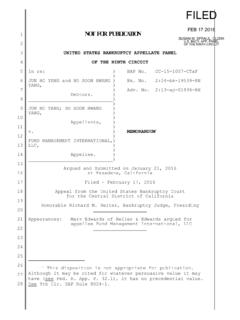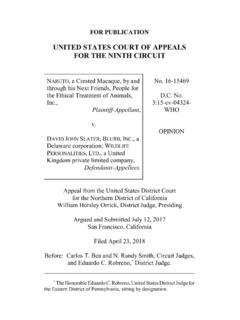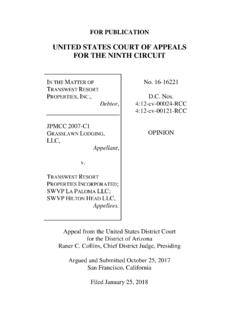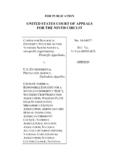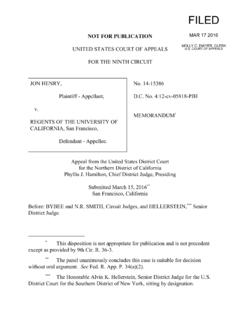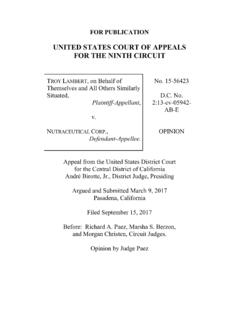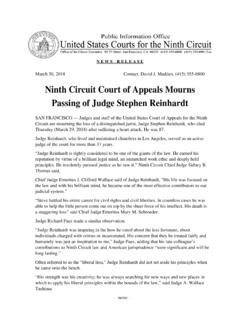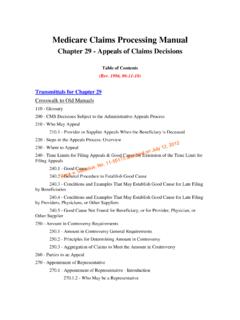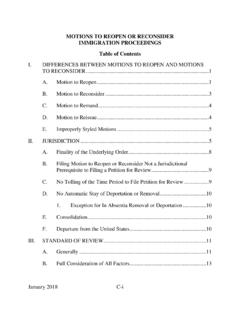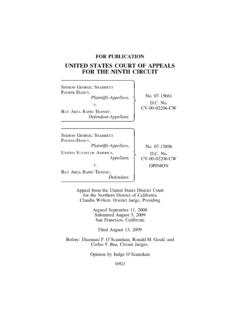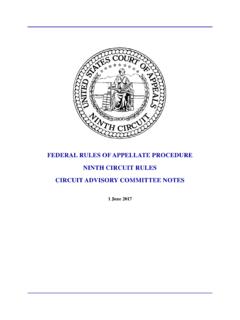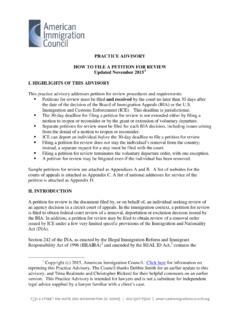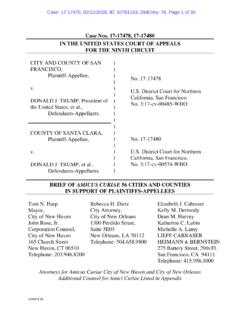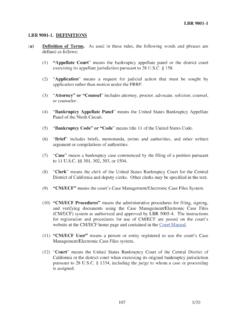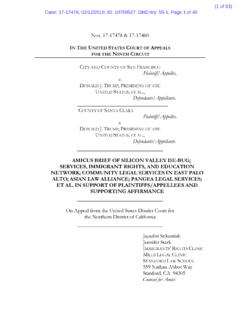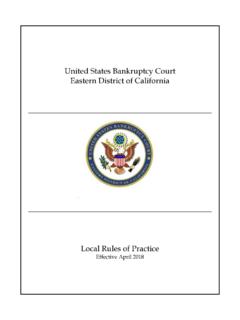Transcription of UNITED STATES COURT OF APPEALS FOR THE NINTH CIRCUIT
1 UNITED STATES COURT OF APPEALS FOR THE NINTH CIRCUIT . Office of the Clerk After Filing an Appeal: An Introduction for Attorneys You have received this guide because you filed a notice of appeal in the COURT of APPEALS for the NINTH CIRCUIT . It provides information you need to know to represent an appellant before the COURT . For Habeas APPEALS If you are appealing the denial of a habeas corpus petition under 28 2254. or 2255, you are receiving this guide because the district COURT or COURT of APPEALS has granted a certificate of appealability (COA) on one or more of the specific issues in the case. Read this guide carefully. If you don't follow instructions, the COURT may dismiss your case. This Guide Is Not Legal Advice COURT employees are legally required to remain neutral; that means they can't give you advice about how to win your case.
2 However, if you have a question about procedure for example, which forms to send to the COURT or when a form is due this packet should provide the answer. If it doesn't, you may contact the clerk's office for more information. ATTORNEY APPEALS (December 2018) 1. WHAT'S IN THIS GUIDE? HOW AN APPEAL 3. PRACTICE RULES AND RESOURCES .. 4. Practice Guides .. 4. Appellate Mentoring Program .. 4. IMPORTANT RULES FOR ALL CASES .. 4. NINTH CIRCUIT Bar Admission .. 4. Register for Electronic Filing .. 5. Complete a Mediation Questionnaire .. 5. Meet Your Deadlines .. 5. Complete Your Forms Properly .. 5. Deliver Papers the Right Way .. 6. Keep Copies of Your 6. Pay the Filing Fee or Request a Waiver .. 6. If You Move, Tell the COURT .. 7. HANDLING AN APPEAL: THREE STAGES.
3 8. Stage One: Opening a Case .. 9. Stage Two: Preparing and Filing Briefs .. 11. Stage Three: The COURT 's Final 15. HOW TO WRITE AND FILE MOTIONS .. 16. How to Write a Motion .. 16. How to File a Motion .. 17. What Happens After You File .. 17. How to Respond to a Motion from Opposing Counsel .. 17. Emergency or Urgent 18. IF YOU DON'T AGREE WITH A COURT DECISION .. 19. During Your Case: Motion for Reconsideration .. 19. After Your Case: Motions and 19. HOW TO CONTACT THE COURT .. 22. ATTORNEY APPEALS (December 2018) 2. HOW AN APPEAL WORKS. The chart below shows the path of an appeal from the lowest federal COURT to the highest. Review these steps to make sure you understand where you are in the process. District COURT or Bankruptcy Appellate Panel. Your case in the COURT of APPEALS may come from a District COURT or the Bankruptcy Appellate panel.
4 In a very small number of cases, if the COURT of APPEALS gives you permission, you can appeal directly from the bankruptcy COURT to the COURT of APPEALS . (See 28 158(d) if you want more information about appealing directly from a bankruptcy COURT .). COURT of APPEALS . When reviewing the lower COURT 's decision in your case, the COURT of APPEALS (usually a panel of three judges). will carefully consider everything that has happened so far. The COURT will also read all the papers that you and opposing counsel file during your case. The COURT will look to see whether a lower COURT or agency has made a constitutional, legal, or factual mistake. You are not allowed to present new evidence or testimony in the COURT of APPEALS . Supreme COURT . If you do not agree with the decision of the COURT of APPEALS , Your case may not go through all of the you can ask the UNITED STATES Supreme stages shown above.
5 For example, if the COURT to review your case. The Supreme COURT of APPEALS resolves your case COURT chooses which cases it wants to the way that you want, you won't need to hear. It reviews only a small number of file a petition in the Supreme COURT . cases each year. ATTORNEY APPEALS (December 2018) 3. PRACTICE RULES AND RESOURCES. This guide highlights rules that you absolutely must follow after filing a case. You are also responsible for reviewing and following the Federal Rules of Appellate Procedure (Fed. R. App. P.), the NINTH CIRCUIT Rules (9th Cir. R.), and the general orders. The Federal Rules and the NINTH CIRCUIT Rules are available at Practice Guides In addition to the rules above, the following guides can support your practice before this COURT .
6 You can find these and other resources on the COURT 's website under Legal Guides: Appellate Practice Guide. A thorough manual of appellate practice prepared by the Appellate Lawyer Representatives. Perfecting Your Appeal. You can view this video for free at or purchase it from the clerk's office for $ Appellate Mentoring Program The appellate mentoring program provides guidance to attorneys who are new to federal appellate practice or who would benefit from mentoring at the appellate level. Mentors are volunteers who have experience in immigration, habeas corpus, or appellate practice in general. If you are interested, a program coordinator will match you with a mentor, taking into account your needs and the mentor's particular strengths. To learn more, email the COURT at or go to On the website, select the Attorneys tab, look for Appellate Mentoring Program, then choose Information.
7 IMPORTANT RULES FOR ALL CASES. The rules in this section apply to all attorneys who file a notice of appeal in the NINTH CIRCUIT . You must understand and follow each one. NINTH CIRCUIT Bar Admission To practice before the COURT of APPEALS , you must be admitted to the Bar of the NINTH CIRCUIT . For instructions on how to apply, go to Select the Attorneys tab, look for Attorney Admissions, then choose Instructions.. ATTORNEY APPEALS (December 2018) 4. Register for Electronic Filing Unless the COURT gives you an exemption, you must use the NINTH CIRCUIT 's electronic filing system, called CM/ECF (Case Management/Electronic Case Files). To learn more and to register, go to then click Filing a Document CM/ECF.. For additional guidance on filing documents and making payments electronically, read the NINTH CIRCUIT Rules, especially Rule 25-5.
8 For a complete list of the available types of filing events, see the CM/ECF User Guide. To find the guide, go to Filing a Document as described just above, look for Documentation & Training, then select CM/ECF User Guide.. Complete a Mediation Questionnaire You must complete a mediation questionnaire unless your appeal is a habeas case (28 . 2241, 2254 and 2255) or a petition for a writ (28 1651). (See 9th Cir. R. 3-4.) The COURT uses the questionnaire to assess settlement potential. If you are required to complete a questionnaire, you must file it no later than seven days after the clerk's office dockets your case. To find the form, go to To request a conference with a mediator, call the Mediation Unit at (415) 355-7900, email or make a written request to the Chief CIRCUIT Mediator.
9 You may request conferences confidentially. For more information about the COURT 's mediation program, go to Meet Your Deadlines Read all documents you get from the COURT . They will contain important instructions and deadlines for filing your COURT papers. If you miss a deadline or fail to respond to the COURT as directed, the COURT may dismiss your case. Complete Your Forms Properly Everything you send to the COURT must be clear and easy to read. If we can't read your papers, we may send them back to you. To make the clerk's job easier, please: Include your case number on all papers you send to the COURT or to opposing counsel. Number your pages and put them in order. If you are not filing electronically, use only one paper clip or a single staple to keep your documents organized.
10 The clerk's office must scan your documents and extra binding makes that job difficult. ATTORNEY APPEALS (December 2018) 5. Deliver Papers the Right Way When you deliver papers to the COURT or to opposing counsel, you must take certain steps to show you sent them to the right place on time. Use the correct address. Before you put anything in the mail, make sure the address is current and correct. To find current addresses for the COURT , see How to Contact the COURT , at the end of this guide. You may deliver a document to the COURT in person, but you must hand it to someone designated to receive documents in the clerk's office. To find the correct address for opposing counsel, see opposing counsel's notice of appearance. Opposing counsel should have sent a copy of this document to you after you filed your notice of appeal.
